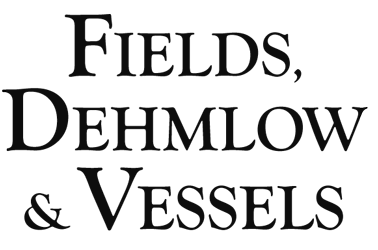High-Value Disputes and Business Litigation
High-Value Disputes & Business Litigation
High-Value Litigation
In addition to representing individuals in injury, wrongful death, and insurance disputes, the attorneys at Fields, Dehmlow & Vessels we will handle high-value business litigation. We have found that the same skills in trying an injury case readily transfer to trying business disputes, and we do try business cases.
What is “high risk” or “high-value” litigation? High-value litigation is not limited only to those cases in which large sums of money are at stake, although that is the most common reason to classify a case as high risk. Other factors can make a case high risk: Is there a real chance of losing the case or failing to realize the result? Will litigating require great expense? Does the case present a complicated legal question? Can the result affect the client’s ability to conduct business? Our firm routinely handles these civil cases for businesses and individuals.
Success-Based Fees
The most common fear for clients facing a high-risk civil dispute is the cost of hiring an attorney by the hour. When possible, and based on our judgment of the merits of the case, we prefer to charge based on our success, a contingent fee. A “contingent fee” means that our fee is based on the result, not how much time we spend—usually a percentage of the recovery.
It has been my experience that clients want an attorney who is willing to share the risk of losing. Most clients do not want to pay an attorney by the hour regardless of the result, and some clients simply cannot pay. We like to share the risk when we can. More than three-fourths of our cases are handled on a contingent fee. When we win, we get paid more. And when we lose (which thankfully has not been very often), we earn no fee.
Of course, not every case is a candidate to work on a contingent fee. In instances where a contingent fee is not feasible, we are willing to work on an hourly rate. However, make no mistake, we value the results.
We do not charge for meaningless work. We do not engage in meaningless discovery. We do not file meaningless motions. Every action is taken for the purpose of winning at trial.
Trial Lawyer
Ethan Vessels is a trial lawyer, which somehow has become a dirty word. There are many lawyers willing to “litigate” a case: file papers, write letters, draft motions, argue with the other lawyer, and hope to settle the case. If we are unable to obtain a fair result, we will try the case either to a jury or to a judge. There are very few attorneys who regularly try civil cases. We regularly try both jury and bench trials. There is both science (knowing the rules) and art (knowing what to say and how to say it) in persuading judges and juries.
And there is work. To get a good result, a client must have a lawyer willing to take the matter all the way through court. Sometimes, this requires filing an appeal and arguing to the appellate court. Although not as frequent as trial work, we have had occasion to prosecute and argue a number of cases in the courts of appeals.
Examples of “high risk” cases that we have successfully handled:
- Eminent domain. July 2008, jury verdict of $389,000 on behalf of a commercial property owner whose land had been taken by the state.
- Insurance. December 2009, $116,000 settlement on behalf of a medical provider that had been routinely underpaid by a major health insurer over the course of several years.
- Business debt. December 2009, $60,000 recovery on behalf of a trucking company whose bill had simply been unpaid by another business.
- Business debt. June 2008, after filing suit, $30,000 recovery on behalf of an ambulance company whose bills had been unpaid by a nursing home facility.
- Construction. September 2008, $75,000 recovery on behalf of a building contractor whose bill had been unpaid.
- Real estate. January 2010, judgment granting a tract of property to the client through adverse possession.
- Financial. November 2009, confidential settlement on behalf of an elderly woman from her annuity insurer, based on our contention that the insurer had fraudulently sold her the annuity product.
- Financial. December 2009, after filing suit, confidential settlement on behalf of a widow who had been the victim of a financial fraud.
We handle a variety of types of cases. When necessary, we seek assistance from specialized co-counsel—at no additional cost to our clients. For instance, in the eminent domain case in 2008, Ethan Vessels associated his former real estate professor (and expert on government takings) to join him in the case. Contact us today for more information on your case.
